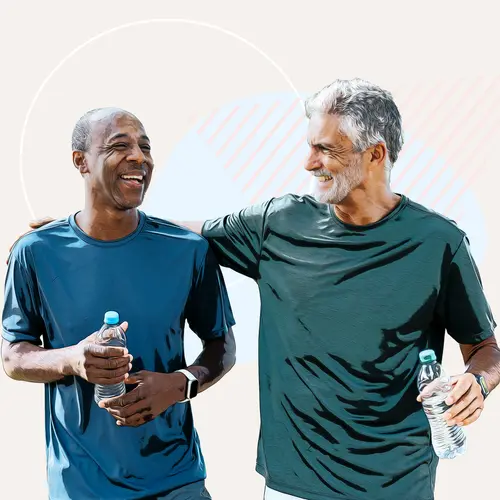Ira Bloom calls himself a yoga "evangelist." By day, the 52-year-old Bloom is a practicing dentist. Two or three times a week, though, after leaving his office, you'll find Bloom at the Greater Baltimore Yoga Center. There, for an hour and a half, he practices a form of hatha yoga known as Iyengar.
Bloom came to yoga quite by accident about five years ago. An ad offering a free week of yoga classes spurred him on, and he's been hooked ever since. "It's a great way to improve your strength, become more flexible, and relieve stress," says Bloom. "It really calms the mind."
Though Bloom says that his ultimate goal is to practice yoga every day, he admits that a hectic schedule makes that difficult. But, he adds, even the two or three times a week he does make it to yoga class has a strong influence on his daily routine. "It just spills over into your everyday life," he says. "You learn to do your life like you do your yoga ... to be centered, to breathe more calmly, and to be focused. Little things don't bother you as much."
Calming the mind not only makes day-to-day living easier, says Robert Bulgarelli, DO, FACC, who practices integrative and preventive cardiovascular medicine at Cardiovascular Associates of Southeastern Pennsylvania, it also has far-reaching effects when it comes to protecting men (and women, too) from the physical damages of stress.
"Yoga, with its combination of meditation and breathing, helps get the mind and body in sync," says Bulgarelli. Men, he goes on to say, frequently downplay the stress that they're feeling, and as a result, tend to develop heart disease at an earlier age than women.
Dealing With Stress
"Women are more in tune with their emotions," Bulgarelli says, "and are better able to handle daily stressors. Men often ignore signs of stress and as a result, their heart rate goes up, their blood pressure rises, their platelets get stickier. ..."
Along with the physical changes brought by stress itself, says Bulgarelli, are the more subtle behavioral changes that accompany stress -- eating less healthfully, exercising less, and engaging in more high-risk behaviors such as drinking and smoking.
"To take 20 to 40 minutes out of your day to sit and be quiet, to gently stretch, and to breathe deeply," says Bulgarelli, "is a tremendous way to reduce stress." Studies have shown, he says, that the various forms of yoga can help reduce blood pressure, body temperature, and heart rate, improve respiratory function, and even change brain waves.
"Yoga has tremendous implications for everyone," says Bulgarelli, "but especially for men, by allowing them to decompress and de-stress."
Bulgarelli says that in addition to its potential to prevent and even manage heart disease, yoga is a good antidote to depression as well, which is epidemic among men in the United States.
"Yoga gives you the opportunity to strip yourself down, to quiet yourself, to just really 'be,'" says Bulgarelli, "and for any men, that may be the first time they've ever done that. The meditative aspect of yoga is the perfect avenue to help you figure out what's going on in your life."
Part of Fitness Program
As if the possible benefits of yoga in terms of stress, heart disease, and depression weren't enough, there are additional advantages of yoga, especially for men, says Julio Kuperman, MD, head of neurology at St. Agnes Medical Center in Philadelphia and associate professor of neurology at the University of Pennsylvania School of Medicine.
Kuperman is also a yoga instructor and director of yoga teacher training at the Baptist Power Yoga Institute in Bryn Mawr, Penn., and has been practicing yoga himself for the past 25 years, long before many men turned to the discipline.
"I believe the present popularity of yoga in America will continue to grow by leaps and bounds as the baby boomers continue to age," says Kuperman. "The male population in particular remains a mostly untapped potential constituency, for yoga has much to offer my gender-mates as we age."
Yoga has much to offer men of any age, too, Kuperman says. It is one of the few physical activities that has a "de-compacting" effect on the body. (Swimming and gymnastics are other examples). This is essential, says Kuperman, to counter the effects of gravity associated with activities such as running or jogging. Yoga also provides much-needed "symmetry relief" to such asymmetric endeavors as racquet sports and golf, which torque the spine in only one direction.
Yoga also supplies flexibility that can help in safely practicing power sports and weight training, says Kuperman. And yoga itself is flexible in the sense that there is a broad variety of yoga styles, ranging from the intense, aerobic, and almost acrobatic practice of Ashtanga ("Power Yoga") to the more meditative style of Kripalu Yoga and the "Hot Yoga" (done in an overheated room) championed by Bikram Choudry, which can become an integral part of any program of physical activity.
"My emphasis as a teacher," says Kuperman, "is to help people incorporate yoga into their existing routines."

